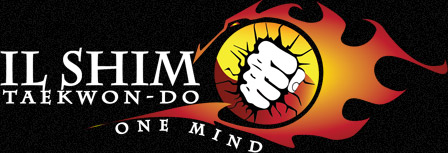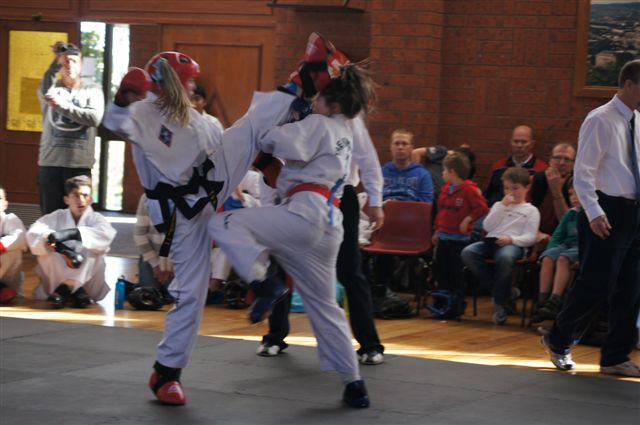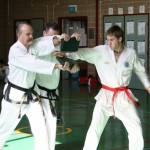ITF Australia IL Shim Taekwon-Do
Il Shim Squad Training, Umpiring Seminar and ITF Victorian Challenge
Melbourne, 30 July 2011.
By Nathan Tyson
While unable to train due to injury, I had the pleasure of watching the Il Shim squad training, and attending the Umpiring Seminar held on Sat 30 July. I also attended the ITF Victorian Challenge in Melbourne on Saturday 31 July.

Squad Training
Mr Frans Christensen (5th Dan Black Belt, Senior Instructor and Il Shim Tournament Director) ran the training session along with from Mr Gerard Kelly (4th Dan Black Belt, Senior Instructor and Il Shim Umpire Manager). Master Daher (8th Dan) was also present as a spectator, but no doubt kept a keen eye on the efforts and progress of squad members.
Mr Christensen has been Head Coach for the Australian ITF Taekwon-Do Team for the last two World Championships (Argentina 2009 and New Zealand 2011) and is currently Head Coach of the squad training for the World Championships in Spain in 2013. Both Mr Christensen and Mr Kelly have significant experience in international competition and a wealth of knowledge of Taekwon-Do patterns and sparring techniques and their application in a competitive environment.
There were 26 participants in the training, from white belts from local clubs through to 2nd
Dan Black Belts. It was great to see a number of senior squad members from interstate in attendance. It was also great to see a number of parents and friends watching the training.
At the start of the training it was explained that the session would be a bit lighter
than usual as most participants were also competing in the ITF Victorian Challenge the following day. (Although I must say that from an observer’s perspective the participants definitely still got a good workout!)
Mr Christensen reminded students that if you have any injury when you arrive for training, or receive an injury during training, it is important to notify your instructor immediately so that the Instructor knows what has happened and so that appropriate first aid can be provided if required.
Participants were initially run through a number of warm up and stretching exercises before moving onto some sparring drills.
One of the drills was an “exploding” jumping punch combination, or
“bull-rushing”. I could see how useful the technique would be, particularly in scoring early points….
As a good Instructor I of course took detailed notes about the drill (and others on the day) so that I can teach them to my students… however I won’t be disclosing too many details here as the privilege of this knowledge belongs with those who attend training and learn it from their instructors J
The bullrush drill was then turned into a competition, with individuals
completing the drill several times without turning their back to the
target… Last to finish of course had to do push-ups.
Mr Kelly explained that the drill was about launching forward to reduce distance between your opponent while executing two attacking movements. The additional (turn and
repeat) drill was to put the drill into a sparring context where it is
important to ensure focus is maintained on your opponent and that an initial attack is
able to be followed up with a secondary attack.
Participants then moved on to another drill involving side kick and hook kick. The purpose of the drill was to show students how to draw in an opponent and utilise a hook kick as a counter attack.
Students were reminded that in competitive sparing certain techniques with the feet (eg hook-kick, axe kick) must use the sole of the foot to make contact rather than the heel. This is to prevent serious injury to competitors. Students were reminded that use of excessive force (which can occur through use of uncontrolled or unsighted techniques) can lead to disqualification of a competitor.
Students then did more drills, focussing on using the hook-kick and back kick to attack and counter-attack.
Mr Christensen explained it is possible (in competition) to attack a legal
target from behind an opponent, eg. Techniques to the side of head or sides of body. However it is illegal to attack the back or top of the head, or the back of your opponent.
A few more drills involving turning kick and back kick were undertaken.
The Instructors then explained that in competition, if opponent rushes at you, you must stop their momentum, to enable a counter attack. Students were given some pointers as to how to effectively stop an opponent from advancing.
Mr Kelly explained that in competition sparring it is sometimes difficult to get opponents to attack, so it is important to know techniques to tempt or entice them into attacking (ie. To enable you to then do a strategic/scoring counter attack).
A number of “games” were played with students testing their coordination, fitness and reflexes in various competitions.
In one game that was enjoyed by all, participants (in pairs) layed down facing each other with fingertips touching. On command each person had to spring up onto their haunches
with hands held out in front. The winners (from best of three) then lined up against each other. Then competition continued until the final between two 1st Dans – Sebastian and Rick. Sebastian did very well to take out first place.
The games were followed by stretching and warm-down.
Mr Christensen suggested skipping is a great exercise and students should
aim for 200 skips per minute(!)
During warm-down Mr Kelly spoke about representing your country as being the highest honour, and that to be the best in the world you need to be doing extra training, and then a bit more. Mr Kelly explained that if students expect to be selected in the Australian team then they need to be very committed to training, saying it is important for all students to continually try to improve and to do strengthening and stretching exercises every day.
Umpiring Seminar
The squad training session was followed by an Umpiring seminar run by Mr Kelly. About 15 people attended the seminar. The session run by Mr Kelly was very informative and a must for anyone interested in umpiring. Mr Kelly explained that Umpiring is a great way to support your club and to be involved in tournaments, and that as an experienced Umpire you are able to participate in International competitions such as the World Championships.
The Umpiring seminar is also invaluable for competitors as it provides a better understanding of the rules of competition and how umpires make decisions. Having a thorough knowledge of the rules and their application enables competitors and coaches to develop strategic approaches to competitive sparring.
Anyone interested in obtaining more information about Umpiring should contact Mr Kelly (see contact details on ITF Australia website).
ITF Victorian Challenge
I also attended the ITF Victorian Challenge in Melbourne on 31 July 2011. It was a great tournament that was enjoyed by all participants. Congratulations to Mr Paul Harper and all those who assisted in making the event such a success.







Leave a Reply
Want to join the discussion?Feel free to contribute!